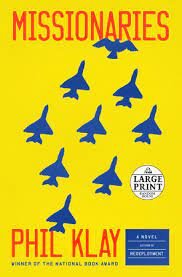Missionaries, by Phil Klay
Phil Klay, who won the National Book Award in 2014 for his short story collection Redeployment, returns with his first novel, Missionaries. Four characters tell their stories— an American female journalist named Lisette, a Colombian former paramilitary named Abel, Juan Pablo, the Colombian Army officer, and Mason, an American Special Forces embassy liaison. The story begins in Afghanistan, where Lisette is chasing stories of war for a wire service, and Mason works as a Special Fores medic. Both are traumatized, exhausted, and spiritually diminished by the relentless, pointless violence without end that is Afghanistan. Lisette, in one of Klay’s memorable comments, asks her boss to send her to a conflict where we’re winning. Mason wants to be able to see his wife and children most nights. Both wind up in Colombia in the months of negotiation leading up to the vote to end FARC, the Revolutionary Armed Forces of Colombia.
Klay is a fine writer, tossing off memorable, pithy observations of life under unpredictable violence. When the scene shifts to a village in northern Colombia, we meet Abel, a 29-year-old man who served in the paramilitary not so much by choice but for survival, after guerillas killed his entire family and much of his village. He was swept up and recruited by the paramilitary, going along with their atrocities just to survive. He has made a break from the group but gets pulled back in when he knows it is either be slaughtered or play along with the slimmest of hopes that he could return to a normal life. It is with Abel that we see how desperate the lives of average Colombians is— between the guerillas, the paramilitary, the narcoterrorist drug traders, the military, and various violent rogue groups, it is a wonder anyone survives. One gets the feeling that the entire population suffers from PTSD that will never end.
Juan Pablo shows the military’s part in this macabre scene, navigating between these violent factions and the American military, whose introduction of new technology only escalates the violence. Klay has clearly done his research, and has a marvelous ability to capture and articulate each person’s voice and perspective. It is a gruesome story by turns, but never gratuitously so. It feels sad, desperate, and often without hope. Juan Pablo’s daughter, an idealistic law school student who interns as a clerk for a human rights organization collecting and documenting stories of the victims of violence, is a stand-in for us, we who have grown up in safe security, while many suffer and die in the crossfire of political and drug violence.
Klay is a gifted writer, and I must recommend this important book. It is our privilege to enjoy our freedoms— we should seek out the stories of others in the world not so lucky.

